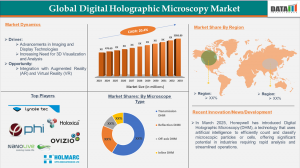Digital Holographic Microscopy Market Growth | Trends, Applications & Forecast 2025 | DataM Intelligence
The Global Digital Holographic Microscopy Market is expected to reach at a CAGR of 20.4% during the forecast period 2025-2033.
Market Overview:
The Global Digital Holographic Microscopy (DHM) Market is witnessing substantial growth, driven by increasing demand for non-invasive, label-free imaging techniques across life sciences, materials science, and industrial inspection. DHM provides high-resolution 3D imaging and quantitative phase contrast imaging, enabling real-time observation of live cells and microstructures. With its ability to eliminate the need for fluorescent staining and phototoxicity, DHM is gaining traction in various research and clinical applications.
Download Sample Report Here: https://www.datamintelligence.com/download-sample/digital-holographic-microscopy-market
Market Drivers & Opportunities:
There is an increasing demand for live-cell imaging in cellular biology and disease diagnostics.
Technological integration with AI, machine learning, and 3D imaging software is enhancing accuracy and automation in biomedical research.
Increased funding in nanotechnology and precision medicine is boosting adoption in pharmaceutical and academic sectors.
Growing preference for non-contact, non-destructive imaging methods in semiconductor and materials inspection.
Market Segmentation:
By Microscope Type:
Transmission DHM
Reflection DHM
Off-axis DHM
Inline DHM.
By Application:
Life Sciences
Material Sciences
Semiconductors
Microelectronics
Others.
By End User:
Academic & Research Institutes
Pharmaceutical & Biotechnology Companies
Hospitals & Clinics
Manufacturing Industries.
By Region:
North America
Latin America
Europe
Asia Pacific
Middle East and Africa.
Stay ahead with data-driven strategies, competitive analysis, and future outlook.
Get the Extensive Full Report Now: https://www.datamintelligence.com/buy-now-page?report=digital-holographic-microscopy-market
Geographical Share:
North America leads the DHM market due to strong research infrastructure, high healthcare expenditure, and the presence of leading market players.
Asia-Pacific is expected to witness the fastest growth, especially in Japan, China, and South Korea, driven by growing R&D investments and expansion of nanotechnology.
Europe holds a significant share owing to government-backed academic research and industrial applications in Germany, France, and the UK.
Key Players:
Leading companies driving the growth of the global Digital Holographic Microscopy market include:
Lyncee Tec
Holoxica Limited
Phase Holographic Imaging AB
Ovizio Imaging Systems
Nanolive SA
Holmarc Opto-Mechatronics Ltd
DAEIL SYSTEMS CO., LTD.
These players are focusing on product innovation, strategic partnerships, and expanding their application scope.
Recent Developments:
United States
2025: A leading US-based biotech company integrated DHM with AI-enabled diagnostics for enhanced cancer cell detection, improving accuracy and reducing analysis time.
2024: Researchers at a prominent American university developed a portable DHM system for field diagnostics and rapid pathogen detection.
Japan
2025: A Japanese imaging firm launched an advanced DHM system with integrated 3D rendering and AI capabilities, aimed at pharmaceutical quality control.
2024: Government-funded nanotechnology labs adopted DHM to support real-time visualization in molecular diagnostics and nano-manufacturing.
Stay informed with the latest industry insights-start your subscription now: https://www.datamintelligence.com/reports-subscription
Conclusion:
The Digital Holographic Microscopy market is poised for significant transformation as it moves from research labs to mainstream clinical, industrial, and academic applications. With increasing investments in advanced imaging technologies, the market is set to experience rapid expansion, especially in regions emphasizing innovation and life sciences development.
Related Reports:
Medical Holography Market
Surgical Microscope Market
Sai Kiran
DataM Intelligence 4Market Research
+1 877-441-4866
Sai.k@datamintelligence.com
Visit us on social media:
LinkedIn
X
Legal Disclaimer:
EIN Presswire provides this news content "as is" without warranty of any kind. We do not accept any responsibility or liability for the accuracy, content, images, videos, licenses, completeness, legality, or reliability of the information contained in this article. If you have any complaints or copyright issues related to this article, kindly contact the author above.
Shaping the Future of Tech: Amar InfoTech Expands Global Reach in Cloud, AI, IoT, and TravelTech
BPMG Secures ChainGPT Grant to Advance AI & Web3 Social Platform Innovation
Regulación inteligente y criptoeconomía: América Latina frente al nuevo orden financiero global
Więcej ważnych informacji
 Jedynka Newserii
Jedynka Newserii

 Jedynka Newserii
Jedynka Newserii

Prawo

Kolejne polskie miasta chcą być przyjazne dzieciom. Planują stworzyć najmłodszym dobre warunki do rozwoju
Cztery miasta w Polsce posiadają tytuł Miasta Przyjaznego Dzieciom nadany przez UNICEF Polska. Dziewięć kolejnych miast czeka na certyfikację, a w ostatnich miesiącach do programu zgłosiło się kilka następnych. Na całym świecie inicjatywa została przyjęta już w ponad 4 tys. samorządów, a w Hiszpanii objęła połowę dziecięcej populacji miast. Program UNICEF-u ma na celu zachęcenie włodarzy do traktowania najmłodszych obywateli w sposób podmiotowy, respektowania ich praw i zaproszenia ich do współdecydowania o przyszłości.
Przemysł
W ciągu roku w Polsce ubyło 500 przedsiębiorstw odzieżowo-tekstylnych. Problemem są spadki zamówień z Europy Zachodniej i wzrost kosztów

Wartość rynku odzieżowego w Polsce wynosi 66,9 mld zł, z czego 10 mld zł to wartość krajowej produkcji – wynika z danych PIOT. Od czasu pandemii branża mierzy się z szeregiem wyzwań, wśród których najpoważniejsze to wzrost kosztów pracy i produkcji, przerwane łańcuchy dostaw i spadek zamówień – zarówno w kraju, jak i za granicą, a także wzrost nieuczciwej konkurencji na rynku, czyli głównie importu z Chin. Skala wyzwań sprawia, że w ubiegłym roku z rynku zniknęło 500 firm. Producenci odzieży apelują do rządu o wsparcie.
Handel
D. Obajtek: Orlen powinien być o 30–40 proc. większą spółką. Byłoby to z korzyścią dla konsumentów

Orlen jest największym polskim przedsiębiorstwem. Jego przychody ze sprzedaży w 2024 roku wyniosły blisko 295 mln zł, a rok wcześniej – ponad 372 mln – wynika z raportu Rzeczpospolitej „Lista 500”. W ubiegłorocznym rankingu Fortune 500 uwzględniającym największe korporacje znalazł się na 216. miejscu na świecie i 44. w Europie. Według Daniela Obajtka, europosła PiS-u i byłego prezesa Orlenu, spółka powinna jeszcze urosnąć, tym samym gwarantując konsumentom szereg korzyści, a także przyspieszać inwestycje m.in. w obszarze petrochemii i energetyki zero- oraz niskoemisyjnej.
Partner serwisu
Szkolenia

Akademia Newserii
Akademia Newserii to projekt, w ramach którego najlepsi polscy dziennikarze biznesowi, giełdowi oraz lifestylowi, a także szkoleniowcy z wieloletnim doświadczeniem dzielą się swoją wiedzą nt. pracy z mediami.








.gif)

 |
| |
| |
|